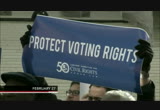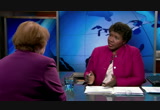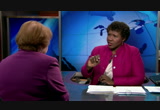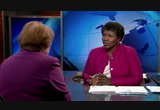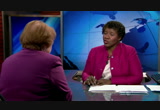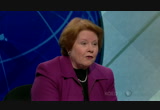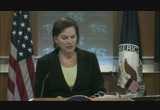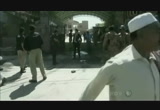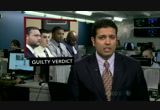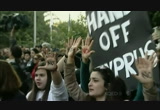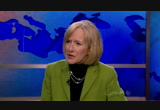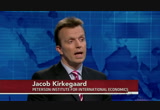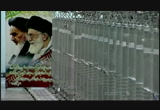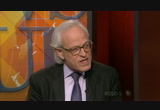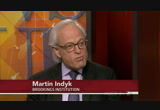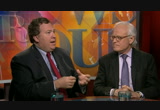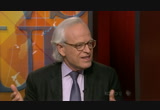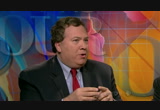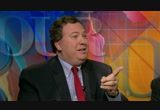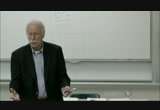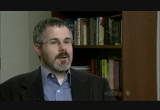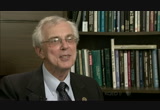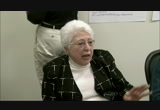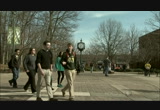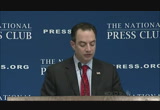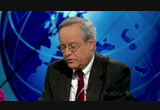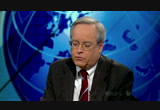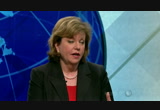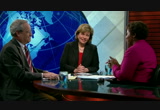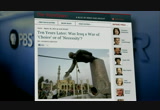tv PBS News Hour KQED March 18, 2013 6:00pm-7:00pm PDT
6:00 pm
literacy in the 21st century. >> and with the ongoing support of these institutions and foundations. and... >> this program was made possible by the corporation for public broadcasting. and by contributions to your pbs station from viewers like you. thank you. >> ifill: today's supreme court arguments pitted a national law against a 2004 arizona voter registration bill. the case explores the extent of state powers against the controversial backdrop of voting restrictions. arizona's proposition 200 requires state residents to provide either a driver's license, passport, birth certificate or physical proof of citizenship before they can vote. but an existing federal law
6:01 pm
requires only a sworn statement of citizenship on a voter registration form. supporters say the arizona measure cuts down on voter fraud by keeping noncitizens from voting. but opponents argue the law unfairly tarring hes minorities, immigrants, and the elderly. the case is only the most recent dispute between arizona and the federal government related to immigration issues. over the summer, the supreme court upheld part of a top state law that allowed police to check for immigration papers. other states, including alabama, georgia, kansas and tennessee, have similar laws on the books and a number of other states are also considering comparable measures. the obama administration supports the challenge to the arizona law. and today's arguments on the heels of another case that could roll back a key portion of the voting rights act of 1965. for more on today's arguments,
6:02 pm
we turn as always to marcia coyle of the "national law journal." she was in the courtroom this morning, and is back with us tonight. so the outcome, marcia, of this could actually tip the federal-state balance on who gets to govern how we vote. >> that's true, gwen. the question before the justices is where do you draw the line between who has the authority to regulate elections. the election clause of the constitution actually gives authority to both. but where is the line when one crosses or goes too far than the other does? so that's the issue before the court. it wasn't clear today that it's going to be an easy line to find. >> ifill: the reason why this arizona law exists is because arizona officials say there's a problem involving illegal or undocumented immigrants registering to vote fraudulently. is there any evidence... did they present evidence today that that's a big problem? >> no, not today. in fact, there was more argument on the other side that there is no problem. but what arizona is saying is there is also a problem with the
6:03 pm
federal law. the federal law doesn't require proof that citizenship. but the way it deals with citizenship as eligibility for registration is it requires the applicant who wants to register to vote to sign under oath that the applicant meets all of the requirements of the federal law. arizona's attorney general thomas horn today told the court that that was an honor roll system that doesn't do the job. he claims and argues that what arizona is trying to do here is provide additional information that doesn't conflict with the federal law's purpose or objective which, as you know, was to streamline and make uniform voter registration across the nation. and basically make it easier to register to vote. >> ifill: this sworn statement, this pledge that i am a citizen is only on federal mail-in forms. it's not any other way that you register to vote. there's some inconsistency.
6:04 pm
>> there is the conflict which brought the case to the supreme court. justice ginsberg said during the argument to general horn, she said congress expressly said in the federal law how citizenship is to be managed. that's by the signature. the deputy solicitor general of the united states who also argued today supporting the challenger said signature attesting to, you know beings that you meet requirements is something that's common on many forms. and you can be prosecuted for perjury if you lie. so there is enforcement capability here. >> ifill: did the justices seem to be interested in debating among themselves the degree to which this is really about who gets the say, whether it's the federal government that trumps state law or the state law which has the right to make its own state-by-state "if the shoe fits" adjustments? >> that was always in the back drop of the arguments. they were very interested in how both requirements work.
6:05 pm
they focused on the language of the federal law which says that a state must accept and use the federal form. on the other hand, the federal law also says that there can be state-specific requirements that are approved by the federal election assistance commission. arizona's special requirement here was not approved by the commission, and a federal appellate court agreed with the commission that it conflicted with federal law. that's what we call running afoul... the result of that is that federal law rules and state law is preempted. >> ifill: the last time you were here talking about the voting rights act section 5 challenge, one of the things that seemed to come up in court that day was a dispute between justices scalia and sotomayer. did we see any of that play out again today? >> there is... justice scalia has a long-running disdain for
6:06 pm
legislative history. at one poin argument during the argument, justice sotomayer said he would refer to the legislative history of the federal law which indicates that congress considered a proof of citizenship requirement and rejected it. she said they pre-faced her question by saying that there are those who do not agree or believe in legislative history. at that point justice scalia raised his hand. that did get a laugh throughout the courtroom that day. but it wasn't a conflict so much as... >> ifill: a little dig. absolutely. ifill: explain to me the justices who debated among themselves or that the lawyers did, how much a change in the way business is done here would affect other states who may be lined up also with laws that preempt or somehow trump federal law? >> well, as deputy solicitor general said. if the federal law is just
6:07 pm
viewed as a floor here. for example, if arizona wins, then he said states can impose additional requirements on registration, and the federal lawl itself becomes a nullity. that is the fear of a lot of organizations from the orgses that brought the challenge to the league of women voters that filed an amicus brief supporting the challengers. congress' intent here was to make registration easier. they fear that if arizona wins, then other states are going to impose other kinds of requirements, not just proof of citizenship. so that is the real concern. if arizona loses, there is no change. on the other hand, the final word may rest with congress. whatever the supreme court does, congress could go and amend the national voter registration act.
6:08 pm
>> ifill: sounds like there could be a consequential ruling. >> it's definitely a very important case and playing out against this back drop as you mentioned of concerns about problems with voting and vote suppression. >> ifill: marcia coyle of the national law journal, thanks as always. >> woodruff: still to come on the newshour, fears of economic collapse in cyprus; the new coalition lineup in israel; the graying of academia; and a grand new plan for the g.o.p. but first, the other news of the day, here's hari sreenivasan. >> sreenivasan: syrian warplanes hit targets inside lebanon for the first time today. fighter jets attacked suspected rebel hideouts near the town of arsal, lebanon, as reported by lebanon's state news agency. at the state department in washington, spokeswoman victoria nuland confirmed the reports. >> jets and helicopters did fire rockets into northern lebanon impacting wadi al kaya near the border town of arsal.
6:09 pm
this constitutes a significant escalation in the violations of lebanese sovereignty that the syrian regime has been guilty of. these kinds of violations of sovereignty are absolutely unacceptable. >> sreenivasan: last week, the syrian government warned lebanon to stop militants from crossing the border to fight alongside the rebels. a suicide car bomber killed at least ten people in somalia today, most of them civilians. the blast happened near the presidential palace in mogadishu and the target was believed to be the country's security chief. hunks of charred metal were all that remained of the cars involved in the blast. fire from the explosion also engulfed the tea rooms that line the road between the palace and the national theater. the al qaeda-linked militant group al shabaab said it carried out the attack. in pakistan, a suicide bomber blew himself up inside a courtroom, killing four people and wounding 40 others. two attackers tried to get into the court compound in peshawar, but only one powered past the police. dozens of wounded were taken out
6:10 pm
of the packed courtroom on gurneys. the taliban claimed responsibility for the attack. president obama announced his pick for labor secretary today, assistant attorney general thomas perez. at the white house, the president said perez' story is a reminder of the country's promise. perez is the son of immigrants from the dominican republic. if confirmed, perez would head the labor department as the president pushes an overhaul of immigration laws and a minimum wage increase. the small community of steubenville, ohio, will back a wider investigation into the rape of a 16-year-old girl. yesterday, a judge found trent mays and ma'lik richmond guilty of sexually assaulting the girl after a party when she was too drunk to move or speak. the high school football players were sentenced to at least one year in juvenile prison and must register as sex offenders. next month a grand jury will consider whether those who failed to speak up-- including parents and coaches-- can be charged. those are some of the day's major stories. now, back to judy. >> woodruff: the day's biggest economic story came from europe, where old worries about debt, bailouts, and public anger found new life again.
6:11 pm
european markets were rattled today by events that occurred on the tiny mediterranean island nation of cyprus. the island is part of the european union, and plans for the government to seize individual bank deposits set off outrage there. it also prompted worries about whether other nations could follow suit in time. as the day wore on, concerns about the region's debt crisis dragged on u.s. markets as well. the dow jones industrial average fell 62 points to finish the day at 14,452. the nasdaq lost more than 11 points to close above 3237. we begin our coverage with this report from emma murphy of independent television news. >> reporter: they held their hands in protest. they are furious with their
6:12 pm
government and other euro-zone leaders. they are people who are having to carry the weight of the e.u. bailout. the bank will get 10 million euros to keep them afloat but cyprus has to find more. it would come through a levy meaning these people would lose between 6-9% of their savings. >> like people putting your hands in your pocket and receiving something. this is something that should not happen in cyprus. >> reporter: these are the people who are really suffering. they saved their money. they put it in the bank. they believed it would be safe. then they woke up to find that their balances had gone down considerably and they couldn't even get access to cash. little wonder after promises from their president that their money would be protected they're now so angry. this person moved to cyprus to run a wedding company. >> my big exern is the business because most of the money in my business account actually pays for weddings here.
6:13 pm
what do i do? do i ask them for more money or do i have to carry the loss. >> reporter: banks are closed until thursday. there's a limited amount of money left. the government has to get parliament to agree to the deal or the bailout fails. they're not confident. >> we shall face a total collapse of the banking system and of the whole economy. >> reporter: such talk may well be brinksmanship. it's not. these people and many more across europe would be forever changed by the events of the past three days. >> woodruff: for a closer look at the crisis in cyprus and why it's captured the attention of europe and the u.s., we turn to jacob kirkegaard, a senior fellow at the peterson institute for international economics. welcome to the program. >> my pleasure. woodruff: why does tiny cyprus, a population just over one million, have europe, the markets, the government so rattled? >> i think there's two main reasons. first of all that europe is
6:14 pm
still kind of on the edge. it doesn't take much to shatter the sort of recent lull of confidence that you have had in europe in the last couple of months. unfortunately, i think cyprus is one such thing. and the other element is that what happens in cyprus and with respect to the cyprusian banks have a large precedent-setting effect for how europe going forward is going to deal with banking crises in other european countries. then it begins to matter a lot also for the rest of the world. >> woodruff: remind us why the banks in cyprus got themselves into this mess. >> there's basically two reasons. one is that the banks in cyprus are very, very large. there's a total of 800% of g.d.p., which is eight times the size of the cyprusian economy as a whole which means if there is a small problem in these banks, then the government has a very big problem because it will not be able to bail these banks out.
6:15 pm
and then what happened after the restructuring of the greek government bonds last year, the cyprusian banks had taken a big bet on these bonds and therefore took a lot of losses as a result. therefore at least one of these banks is now bankrupt and the government can't afford to bail this bank out. therefore it has had to approach the international community for assistance. >> woodruff: and right now this idea of taking money out of individual... from individual depositors, where did the idea come from? >> well, the idea is kind of unique. i regard it as a sort of willie sutton rule. you know, named after the bank robber who once said why did you rob the bank? well, that's where the money is, he said. the reason that the international community and the cyprusian government has decided to go after bank depositors in cyprus is that really there aren't any other valuables there. and the problem that cyprus has had is or still has is that the
6:16 pm
financing needs that they have are so big, it's 100% of g.d.p. approximately. they needed to bring down that number to about 60% of g.d.p. which is what they're now perhaps going to get. by taxing depositors, they actually have the ability to also tax nonresidents, as we saw in your clip just now. there's a lot of british there but there are even more russian depositors so in that sense you actually end up having the ability to bring in tax revenue from non-cyprusians. that's a big advantage for the government of cyprus because this is money that otherwise they would have had to raise by cutting pensions or other types of austerity measures. >> woodruff: the russians and others stand to be hurt pretty badly by this. >> basically that's part of the strategy or the intent of both the euro area, the i.m.f. and the cyprusian government. >> woodruff: but the signal that sends, i mean, what's the message it sends to the rest of
6:17 pm
europe? i mean, how worried should they be that what's going on in cyprus and we don't know how this is going to play out because the banks are closed for the next few days. how worried should the rest of the banks in europe be? >> i don't think there's an immediate risk of sort of contagious bank run in other european countries in spain or italy. because they are separate countries. i think there's a good reason to believe that the majority of the bank depositors in these countries probably don't even know what's going on in cyprus. then secondly, the international community have ring-fenced the operations of cyprusian banks in greece so that depositors in greece will actually not be affected by this new tax. and then the third element is, as i said earlier, that the cyprusian banks are so big that they really don't replicate the financial systems in any of the other european countries which means that this isn't something that can be used elsewhere, in my opinion. >> woodruff: what does it say to
6:18 pm
the european central bank which is akin to our federal reserve had the power, the ability to force the banks in cyprus to do this? >> well, it basically says that the e.c.b. is not a normal central bank. it is a central bank that actually has real political power. what they said to the cyprusian government together with the germans and others and the i.m.f., "look, unless you accept this deal, we're going to shut down your banks come tuesday and your economy is going to collapse." so it certainly shows that the e.c.b. is a very forceful and powerful central bank. it also shows that the e.c.b. has actually changed its strategy quite a bit from earlier in this crisis because back when i... when ireland needed a bailout because of its banks getting into trouble, the e.c.b. was actually very forceful in preventing bond holders and others from taking any loss s so they had changed their behavior quite a bit. >> woodruff: when the banks
6:19 pm
reopen, what happens then? and what about here in the u.s.? how concerned shall you we be. >> essentially i view cyprus was right now being between the first and the second tarp vote here in the united states. basically it takes a few days unsurprisingly for the sort of people's representatives to realize that they really don't have a choice. it's the choice between something terrible and something catastrophic. so i think this deal will pass the cyprusian parliament within the next couple of days. the banks are likely to reopen especially at the end of the week. at that point in time i would expect that a lot of people would take their money out of the bank: it may be necessary to have further capital controls or restrictions on banks, but i think beyond that, i don't think we're going to see any major effects across europe or to the united states for that matter. >> woodruff: long term. no. i think this is the sort of crisis of the week, if you will. >> woodruff: i guess that's a relief. jacob kierkegaard, thank you. >> my pleasure.
6:20 pm
>> ifill: later this week, president obama travels to israel, the west bank and jordan. iran, syria, and reviving the middle east peace process will be high on the agenda. the president faces challenges bridging differences between israelis and palestinians, and fractures within both camps. we'll examine those divisions tonight and tomorrow night. jeffrey brown begins with israel's new government. brown: in jerusalem today, workers literally rolled out the red carpet as part of a final preparations ahead of president obama's trip to the region. at the same time, israel's new coalition government was itself installed. led again by prime minister benjamin netanyahu but including new key players. its formation took weeks of negotiations after netanyahu won re-election in january's parliamentary elections. a victory accompanied by the
6:21 pm
surprisingly strong second-place finish of yair lapid. today netanyahu had to say about his new government stance on relations with the palestinians. >> with a palestinian partner who is willing to conduct negotiations in good faith, israel will be prepared for historic compromise that will end the conflict with the palestinians forever. >> brown: on one important issue, new jewish settlements in the west bank and east jerusalem, the country's new housing minister said yesterday that building would continue in, quote, accordance with what the government's policy has been thus far. palestinian leadership has refused to enter peace talks while israel continues the settlement policy. another issue at the top of the new government's agenda is iran and its nuclear program. >> we face very great threats. iran continues in its race to obtain an atomic bomb. it continues to enrich uranium in order to produce a bomb.
6:22 pm
>> brown: iranian officials have said their nuclear work is only for peaceful purposes. in an interview that rared on israeli television last week, president obama said it would take iran a year to develop a nuclear weapon, a longer timetable than that put forward publicly by israeli leaders. but the president reiterated his commitment to keep that from happening. >> when i say that all options are on the table, all options are on the table and the united states has significant capabilities. but our goal here is to make sure that iran does not possess a nuclear weapon that could threaten israel. or could trigger an arms race in the region. >> brown: the new cabinet does not include members of israel's ultraorthodox parties. they've been excluded for the first time in a decade. martin s. indyk is a former u.s. ambassador to israel, now vice
6:23 pm
president and director of the foreign policy program at the brookings institution in washington, d.c. and david makovsky is the director of the project on the middle east peace process at the washington institute for near east policy. welcome to both of you. martin, let me start with you. as the president goes to israel, what will he find in general terms in this new government? what do we know or not know? >> well, it's only a couple of days old. so it's a very hard to tell exactly what it's going to shape up to. what we have is right wing party with a shift within the likud further in the right in terms of its composition. we have a large center party, lapid, this new rising star. then to his left is tzipi livni who was the only candidate to campaign on the two-state solution. he only got 56. >> brown: somehow they all worked together or were supposed to work together. >> there's a special glue on the
6:24 pm
seats of israeli cabinet chairs which kind of keep them stuck there for a while at least. they have to respond to their constituency. that is the key point here. their constituents wants them to focus on domestic issues, social issues, on sharing the burden of getting the ultraorthodox serving the army. those are the primary issues that they're going to have to deal with. >> brown: david makovsky, what do you see? >> basically both president obama and netanyahu were elected on a more domestic platform. martin is 100% right in the way he depicted it. basically the israelis see the middle east and see things very murky, very tumultuous, uncertain. they don't feel they have an ability to shape this middle east. they don't know where egypt is going. they don't know if syria is disintegrating in front of their eyes. they said, look, one thing they can make a difference is the domestic scene. what they basically have i think is two sets of issues.
6:25 pm
one, a desire to integrate the ultraorthodox into the work force, into the military which is compulsory for everyone but the ultraorthodox and to wean away the ultraorthodox from being the primary welfare class. the second thing is that netanyahu, lapid that we saw in the set-up piece and this guy bennett both have kind of a neo liberal economic reform approach. they want to move quickly on those sorts of things. those are, i'd say, the two main domestic drivers. >> brown: when we get to the thing we always talk about israeli-paal relations, martin, is it clear where the government stands? is there even a possibility given this focus on domestic issues for any movement there? >> as we saw in the set-up piece the prime minister continues to say that he would like an historic compromise with the palestinians. but within his own party, his defense minister and his foreign minister say nothing can be done with the palestinians. the other rising star, naftali
6:26 pm
bennett says that his platform is to annex the west bank and he'll never agree to a two-state solution. so the only supporters of the two-state solution are lapid and tzipi livni. the prime minister... but it's clearly any movement forward on this is going to split this government. so it was hard to see how the previous government would move forward. i think it's even harder to see how this government is going to move forward. >> brown: do you see any potential? >> i think there is some potential here. out of 68... remember it takes 61 out of 120 to have a majority in the knesset. you have 25. as martin said, they are not part of this right-of-center block which has doubled when barack was the defense minister. so you do have a group. what keeps things the way for israel to be a normal western country goes to the palestinian issue. it will be interesting to see how it turns out. martin is correct that the key
6:27 pm
positions the defense minister, the housing minister and the knesset finance chairman are pro. the one glimmer is this idea of reciprocity. ya'alon believes the palestinians are two states for two people. they don't say that anymore. i was in ramallah last week too and i just came back yesterday. i'm a little concerned on the palestinian side. there's a belief, you know, we're on the highway. the israelis are ice rated. we went to the u.n. we'll go to the international criminal court. i feel they think there's no reason to compromise. i feel the open sesame is just to get the basics. if the president can get the palestinians and the israelis to talk about two states for two people it might sound like a cliche but i think it's the one thing that could have an impact on this because it deals with... does each side recognize that they are palestinian and jewish nationalists movements? the israelis are willing to do it but the palestinians are not. >> brown: we're going to focus
6:28 pm
tomorrow specifically on the palestinians. i'm wondering on the israeli side, is it fair to say that their real focus now as a security issue is much more on iran than on palestinian relations? >> iran i think in the exit polls only rated 10% of the people said that it was the top priority in the israeli election. it really didn't play in the election campaign. i think it does remain a threat, an existential threat. as the president said it's a year away before they get the bomb. he wasn't challenged by anybody as far as i know. which was kind of interesting because netanyahu said... >> brown: he's had a much closer... >> he's not challenging the president. i don't expect he will when the president is there because he has ever interest in showing that everything is hunky-dory between him and the president. it's not that the issue has receded. it's just that the israeli public are focused on the
6:29 pm
domestic concerns at the moment. levels of violence are at an all-time low. this turmoil around them everywhere they look. but somehow they've turned inwards and they want their government to... >> brown: we all remember benjamin netanyahu at the u.n. with the bright red line. he was the one talking about a much closer deadline. >> i would say this. i would say... where i differ just a little bit is this: i feel that the israeli public largely wants the united states to take care of this problem. they would love to see diplomacy works. if there's a breakthrough, they could forget about this usual uwe. the second choice the united states of america is the super power. let them deal with it. but i think that the third choice is if you don't get your first two choices in life and the same security establishment that to a man and woman mostly to a man wants the u.s. to take care of it, including ya'alon
6:30 pm
who is not known as being as energetic as barack. if it turns out that barack obama doesn't succeed with the diplomacy -- there will be real tension on the ground and the quiet meeting on what won't come out to the public on what is a breakthrough in diplomacy. obama doesn't deal with it and he says i'm not bluffing but he's bluffing. then the same people i think swing around to netanyahu and because i've been looking for years, i cannot find one supporter of containment. the idea that israel can live with the bomb. both u.s. and israel share that objective of iran not having a bomb. but i think the security establishment feels that if the u.s. doesn't do it, they have to deal with it. i think this is going to be a huge issue behind closed doors but it won't come out in public. in public it will be a great success story. obama will succeed. you'll see. >> brown: we will see what happens later in the week. we'll follow it. martin indyk, david makovsky thank you both very much.
6:31 pm
>> ifill: margaret warner is traveling with the president to the middle east. her first report tomorrow will examine the political and ideological rifts among the palestinians. >> woodruff: now, the latest in our series of reports about older workers. our focus this time: the interesting and sometimes perplexing dilemmas colleges and universities face as their teaching workforce is graying. economics correspondent paul solman was back on campus, part of his on-going reporting, "making sense of financial news." >> when my doctor or my wife tells me i ought to stop, i will stop. >> solman: 75-year-old former george washington university president stephen trachtenberg still teaches public service there. >> you guys are all working well togetherm and that's wonderful. >> solman: at george mason university, 71-year-old writing professor don gallehr is still teaching too.
6:32 pm
>> if the kids are happy and learning and i'm happy and learning, i'm here. >> solman: and how long does 69- year-old boston university particle physicist larry sulak plan to keep blowing up protons? >> i have no idea. shelly is a good model. >> solman: that would be his 80- year-old colleague, nobel- winning physicist sheldon glashow. and when do you intend to retire? >> that i don't know. >> solman: america's work force is graying, and academia along with it. professors over 65 have more than doubled since 2000. some 40% of all workers say they'll work past 65. in academia, however, a full 75% plan to work past a normal retirement age. historian claire potter is at the new school in new york. >> most of us believe that we should be able to work on our own terms for as long as we want. >> solman: potter blames lifetime tenure, meant to protect professors from political firings, and the legal end to mandatory retirement in 1994.
6:33 pm
but potter insists she'll be different. >> i'm going to retire when i'm 67. >> solman: a blogger for the chronicle of higher education, potter has argued that older scholars are clogging the pipeline for the younger ones. the number of ph.d's now far outstrips the number of tenured job openings. >> there's a lot of rage out there about being trained for jobs that you can never have. is it worth keeping younger people out, not giving them the chance to have full-time work, to develop themselves, so that older people can hang on to keep everything we love? >> solman: and these days, even younger people aren't always spring chickens. it's been seven years since 38- year-old joe fruscione earned his ph.d in english from george washington university. he has yet to land a full-time job. >> the market for ph.d's in humanities is almost super- saturated. there have been some positions where i've had to compete with hundreds of applicants who all on paper have roughly the same
6:34 pm
education and skill sets. >> so fruscione works three part-time gigs. one is running a moby dick discussion group at a washington, d.c. bookstore. >> when you hear moby dick, you think... >> whale! >> solman: fruscione also has part-time posts at university of maryland, baltimore county, and g.w. so-called contingent faculty like fruscione are paid class by class. fruscione earns $4,500 to $7,500 per course, and typically teaches eight over two semesters-- all in, less than $50,000 a year. >> there aren't any guaranteed benefits, or anything towards retirement. it's essentially getting paid just for the teaching. it's hard in some level to predict how much i'll get paid per week or per month. >> solman: of course, cost- conscious colleges could rely on cheaper contingent labor even if tenured faculty were retiring.
6:35 pm
but immovable veterans are an added impediment. don gallehr has been teaching just what joe fruscione does, for 47 years. >> am i keeping somebody who wants a tenure track job from getting a job? yes. ( laughs ) and that's okay, as long as i'm a good teacher. that's what's important. >> solman: sheldon glashow, hired away from harvard by boston university at age 67, heartily agrees. >> i'm still actively engaged in the triumvirate of activities that are required of a b.u. faculty member. i teach, and i teach well, most of the time, and i engage in service activities, and i do research, and i do it well. >> solman: now, if some of us don't ebb as we age, glashow is a good bet to be one of them. at age 78, he debunked a much- touted experiment claiming that particles could move faster than the speed of light. for most of us, though, cognitive function shrinks with
6:36 pm
our height, our abs, our libido. in work by harvard economist david laibson and others, skills like word recall and counting backward from 100 by sevens decline steadily throughout life. but as we age, we gain experience. our so-called experiential capital rises. the net effect is positive. people become better decision- makers as they age-- up to a point. but the negative effects start to dominate in our 50's. and by the 70's, the decline steepens for the average person. steve trachtenberg is 75. >> i'm still cooking with gas, but i'm not the man i was at 65 or 55. >> solman: even so, trachtenberg thinks traditional retirement at age 65 is too young. >> people live longer now and are healthier longer now. but i think having an age at which the institution and the
6:37 pm
individual could together decide whether the person ought to retire would be a useful thing. >> solman: trachtenberg says 70 would be a good age to do that. so why does he continue to work at 75? >> well, if we had the conversation, i'd push back. i'd say, no, im still working! >> everybody's situation is different. >> solman: george mason psychology professor lou buffardi is retiring this spring at age 70. but he doesn't think everyone should. >> there are many folks my age and older who are remaining at the university and are some of our very best people. >> solman: sure, says claire potter, but there's a catch. >> i think one of the things you get if you have an aging faculty is, there's a kind of break on innovation that is unnecessary. younger people who are going into academia are more excited about their teaching. many of them are involved in the digital world, and they have a substantially less important role in shaping what we teach, how we teach, and how our universities run than much older people who were educated 30, 40,
6:38 pm
and even 50 years ago. >> solman: but let's face it, today many of us are working past the traditional retirement age. i myself am 68, have been a tv business reporter for 36 years, and teach. but i have no plans to hit the hammock. look, a lot of us love our work, even define ourselves by it. professors are no different. >> there's a piece of what we do that really impacts our self- identity, and it isn't just a job. it's who we are. and to leave that is just tough. >> solman: lou buffardi has joined george mason's voluntary phased retirement program. long-serving faculty teach a reduced course load for two years at full pay in return for a promise to retire thereafter. >> as it gets closer, i thought, you know, what was i thinking? >> solman: one-third of george mason's tenured professors are 60 plus, up from just 10% in 1990. it's one of many schools trying to grease the skids to
6:39 pm
retirement. >> the central task of retirement is really finding activities that provide meaning and purpose for your life. >> solman: it gives courses on lifestyle and financial planning... >> this is your new favorite exercise. >> solman: ...even tips on staying in shape. more faculty left after phased retirement debuted in 2010. mason now runs focus groups to find new incentives. >> if they had offered a part- time job in perpetuity, i would have been first in line to grab it. >> solman: but don't these people have a fallback? hobbies, say? >> we're so entrenched in everyday crises and writing and doing what we have to do here that we leave very little time for anything outside. >> i think it's more also that when you leave, there's a real sense of being physically disconnected, that you don't belong to that place somehow.
6:40 pm
i'm not sure what it would look like, but if there were a space where you could work or you could have some of your books or something. >> we should just take over a building! >> solman: larry sulak claims neither he nor his older colleague sheldon glashow has lost a step, but as chair of boston university's physics department, he had to ease out many over-the-hill underachievers. their first reaction? >> i'm not going to go. i don't have any reason to. but you sit down and talk to them, and you find out what the sweeteners are. what does someone really want? an office forever, a title of emeritus, help getting a job elsewhere, helping his wife or his husband get a job? all these things are necessary, and you play every trick you can. >> solman: because, say sulak and others, you need to renew the ranks, nurture the next generation. and these days, more and more scholars wait in the wings--
6:41 pm
like joe fruscione, who, after wrapping up his contingent class at george washington, traipses back to his car-- he doesn't even get a parking space-- and drives to his next adjunct class in baltimore. >> it takes about 45 minutes to get there in the middle of the afternoon, which is not horrible, it's not great. >> solman: no wonder folks like fruscione are called "road scholars," their careers a constant commute as their elders stay put. what keeps them humming along? >> there's a way where this is a very nice job, a tenure-track job-- one set of colleagues, one office, one parking space. >> solman: and if he got that, he might never want to leave either. >> woodruff: how long do you plan to work? we want you to weigh in. go to paul's making sense page to let us know. >> ifill: we turn now to politics, as republicans plot a
6:42 pm
path forward with a new report that examines what they must do to reclaim the white house. last november mitt romney became the fifth of the last six republican presidential nominees to fail to win the popular vote. last week he told a meeting of party conservatives that he fell short. >> as someone who just lost the last election i'm probably not in the best position to chart the course for the next one. >> ifill: romney's defeat has inspired much republican soul searching. today party chairman reince priebus unveiled his solution. >> we want to build our party. we want to do it with bold strokes to show we're up to the challenge and we're done with business as usual. >> ifill: the 98-page report detailed the party's failures in 2012. >> as it makes clear, there's no one reason we lost. our message was weak. our ground game was
6:43 pm
insufficient. we weren't inclusive. we were behind in both data and digital. and our primary and debate process needed improvement. so there's no one solution. there's a long list of them. >> ifill: called the growth and opportunity project or g.o.p., the report is unsparingly self-critical, conceding among other things that the party is increasingly seen as the province of, quote, stuffy old men. the report recommends the g.o.p. spent $10 million toward new minority outreach efforts and even more on technology and building an improved voter database. embrace comprehensive immigration reforms, and restructure its presidential nominating process to reduce the number of primary debates and settle on a nominee earlier in the year. former florida governor jeb bush used last week's conservative political action conference to
6:44 pm
foreshadow many of the conclusions contained in today's report. >> we must move beyond the divisive and extraneous issues that currently define the public debate. never again, never again can the republican party simply ride off... write off entire segments of our society because we assume our principles have limited appeal. they have broad appeal. >> ifill: but senator marco rubio told the conservative meeting that the party should not embrace change for its own sake. >> and so our challenge is to create an agenda applying our principles. our principles, they still work. applying our time-tested principles to the challenges of today. >> ifill: yet the biggest hit at last week's conference hailed from outside the national party mainstream. they included kentucky senator rand paul, south carolina governor nicky haley and 2008 vice presidential nominee sarah palin. joining
6:45 pm
joining us now to talk about how deep the party's fissures go are susan page, washington bureau chief for "u.s.a. today." and stuart rothenberg of the "rothenberg political report" and roll call. if you listen to jeb bush and reince priebus talk, i got the sense they were giving belated rebuttals to the 47% will never vote for us argument. >> they called this an autopsy on the republican party. on whom do you do an autopsy? something that is dead. i think that reince priebus, jeb bush and other establishment republicans feel that the party has gone seriously astray. in an america that is increasingly diverse and younger, it's chartered an appeal that will not be able to win a national election unless they change course. >> ifill: how unusual was it for you to read something 100 pages worth of that much... i think i called it unsparing criticism. >> very forthright and forth come to go the party's problems. susan i were talking about this. we have seen parties go through this angst over the decades. you get the sense that there are
6:46 pm
many people in the republican party that believe this is an unusually difficult period that they face. the future is rather bleak unless they make some dramatic changes. >> ifill: are they talking message or policy? >> a lot of this talked about message, but i wonder if they're correct. you can talk about putting something in a nice box but if the content of the box hasn't changed i'm not sure it will appeal to people. if you don't change the policies that have prompted a lot of minorities, african-americans, hispanic, asian-americans to go with the democratic party. i'm not sure it has an effect. >> ifill: i remember hearing about the big tent many years ago. >> part of this is about mechanics. it's about how many phone calls and who makes the calls and the amount of data you have and microtargeting and things like that. that i think the national party can talk about and do and raise money for. susan is right and you're right the problem is the message and whether this is a big tent party or not. this report was clearly written
6:47 pm
by big tent folks. when you look at the people who are involved in drawing it together, a top ally of jeb bush, ari fleischer who is a big tent republican. the national committee women from puerto rico. the national committee from south carolina who happens to be african-american. these are folks who understand the party has a message problem. the problem is there are lots of republicans and conservatives who think a different message is a better message. >> ifill: this is what the party chairman and the party mainstream says but that's not necessarily what anybody else is saying who is driving the party. >> that's right. who has been the foot soldiers for g.o.p. for a generation have been provided by evangelical christianes and social conservatives who would not be happy with a party that moderated its position on abortion rights or that embraced same-sex marriage. that's one problem. where is some of the energy from the party now? who won the c-pac straw poll, rand paul not an establishment republican, a person from the
6:48 pm
libertarian wing of the party. they are not together on some of the mechanical things. the report recommends going to primaries as opposed to caucuses and conventions because that's a broader electorate. well, caucuses and conventions are the way somebody like a rand paul or even a rick santorum is going to be able to be a real competitor for the nomination. >> ifill: it talks about cutting in half the number of primary debates. a little bit of the early season cannibalization doesn't occur. >> we see this after party loses a presidential race or two. >> whatever they did last time. they try to do something else. but i think the problem for the r.n.c. is this. our politics and our lives, our world, has changed. we're no longer... politics is no longer dominated by the hierarchical national parties that 40, 50 years ago could dictate who can run for office and when to have conventions and raise the money. you have all these other sources of power and influence, whether it's talk radio or tea party
6:49 pm
groups. >> they want these friends and allies to take a lot of those... a lot off their plate. >> the friends and allies have a different view of where the party needs to go. that's the problem. >> ifill: let me ask about outreach for a moment because one of the things they did in this report was a complete turn-around from where the party has been. that's on hispanic outreach in saying that the party should embrace the word is comprehensive immigration reform. even a lot of democrats aren't saying that yet. >> contrast that to what we heard about immigration in all the primary debates where there was a rush to see how harsh you could be on the issue of immigration. the republican party nationally is trying to turn on a dime on the issue of immigration. you know, to get an immigration bill through a republican-controlled house. you hear from a lot of members either silence or they continue to represent districts where comprehensive immigration reform for the 11 million illegal immigrants that would not be a
6:50 pm
popular thing. immigration is perhaps the best possibility for a big piece of legislation to get through this year but it not a done deal. >> i think it reflects party establishment, how strongly they feel about hispanics as an important constituency in the party going forward. >> ifill: one thing that governor romney and reince priebus said that the future of the party lies with governors. it raises an interesting question because their last nominee was a former blue state governor. how is that the solution? >> they've elected governors. they have 30 governors in this country now. they have a lot less success electing senators or presidents. some of the most interesting figures in the party. some of the figures who might be able to bridge the divide, the factions of the g.o.p. are in fact governors, a bobby jindal or chris christie, a susan martinez. some of the more interesting republicans that might have broad appeal are in the state
6:51 pm
houses. i think that's why he talked about that. >> i understand this argument. it's true. governors have to balance budgets. they have to raise revenue and cut spending to balance the budgets. they have to deliver services. it's like a con stit ensy. but let's remember that why do we have most of these republican governors? 2010 elections. i went earlier today and looked to see what percentage of the african-american votes some of these governors got. it's not all that different. romney got 44% of women. scott in florida got 45. walker in wisconsin 48. when you look at younger voters and hispanics they did better but not dramatically. >> ifill: we don't know whether there will be a fundamental change. susan page, what's your name again, stu rothenberg? thank you both very much.
6:52 pm
>> ifill: online, you can read more about the party's self- examination, what chairman priebus said today, and find a link to the full r.n.c. report. plus, watch behind-the-scenes video dispatches from the weekend's conservative conference. that's on our politics page. >> woodruff: again, the major developments of the day. the supreme court considered a case involving an arizona law that makes people prove their u.s. citizenship before they register to vote. european union leaders called for a tax on savings accounts on the mediterranean island of cyprus, prompting a drop in global stocks. and syrian warplanes hit targets inside lebanon for the first time. the u.s. state department called it a "significant escalation." >> ifill: this week marks the tenth anniversary of the start of the iraq war. we're collecting your reflections. hari sreenivasan explains. >> sreenivasan: where were you when you learned we were going to war? how would you describe the last decade? what lessons are you left with? share your thoughts and stories with us. you can find the details on our home page. on making sense, larry kotlikoff answers your social security questions, including how do you get the most out of your benefits if you're the breadwinner in the family and
6:53 pm
earn a lot more money than your spouse? and you can watch live stream video of the formal installation of pope francis tomorrow, starting at 3:30 a.m. eastern time. that will be on our world page. all that and more is on our web site, newshour.pbs.org. >> ifill: and that's the newshour for tonight. on tuesday, we'll have a report on the official ceremonies at the vatican for pope francis. vice president biden will lead the u.s. delegation. i'm gwen ifill. >> woodruff: and i'm judy woodruff. we'll see you online, and again here tomorrow evening. thank you, and good night. >> major funding for the pbs newshour has been provided by: >> bnsf railway. >> macarthur foundation. >> and with the ongoing support of these institutions and foundations.
6:54 pm
6:58 pm
this is nightly business report. >> markets around the world sell off as investors worry about a bank bailout plan for cyprus means for trouble. >> paul krugman diagnoses american's biggest economic challenges and builders say demand for homes up and so are costs and buildable land is scarce. why home builders aren't as confident. we have that and more starting right now. >> good evening. tyler, it's amazing how one small country in the mediterranean can create big problems for the rest of the world. >> this is a tiny bite. stock markets around the world wobbles as part of the plan to bailout cyprus. part of the plan will take money from the depositors.
6:59 pm
cyprus has an economy the size of vermont but the assets eight times more than the country's gdp. therein the financial woes come as no surprise to analysts. listen to what alan greenspan said friday. >> europe has been hanging over the american markets for quite a while. the removal of that risk, i think temporarily, i think it is only temporary, has enabled the underlying forces of the market to begin to come into vision. >> and today, the clearer vision that greenspan referred to was clouded the cyprus, we have the report by cyprus matters. >> reporter: cyprus is a smaller island with a smaller economy. but now the
181 Views
IN COLLECTIONS
KQED (PBS) Television Archive
Television Archive  Television Archive News Search Service
Television Archive News Search Service 
Uploaded by TV Archive on

 Live Music Archive
Live Music Archive Librivox Free Audio
Librivox Free Audio Metropolitan Museum
Metropolitan Museum Cleveland Museum of Art
Cleveland Museum of Art Internet Arcade
Internet Arcade Console Living Room
Console Living Room Books to Borrow
Books to Borrow Open Library
Open Library TV News
TV News Understanding 9/11
Understanding 9/11

